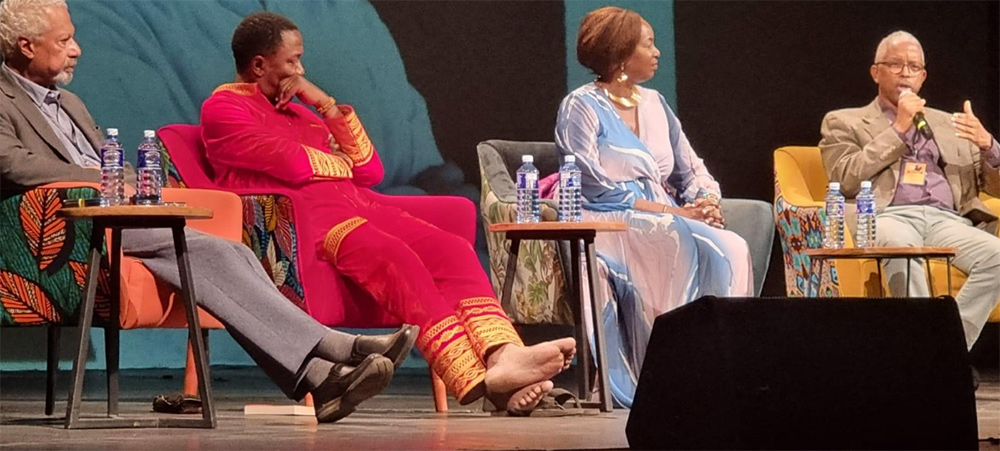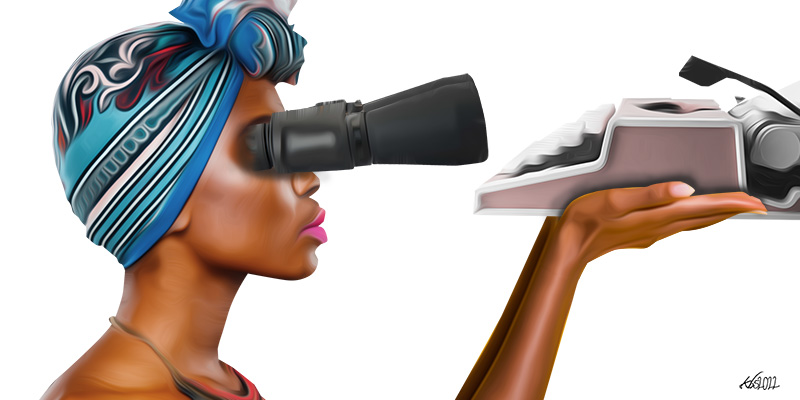The just ended Macondo festival that took place in Nairobi between the 30th of September and the 2nd of October provided a rare insight into the lives and loves of some of Africa’s leading authors today—from Lusophone, Anglophone and Francophone Africa. The festival was organised by the Macondo Book Society which is led by journalist Anja Bengelstorff and award-winning Kenyan author Yvonne Adhiambo Owuor. It attracted some of the best writers to come out of the continent in recent times. The programme was moderated by, among others, Aleya Kassam and Dr Mshai Mwangola—gurus who helped create lively conversations on a deeply profound subject. The Orature Collective’s reading of excerpts from some of the works helped give a performative grounding to the festival. Scholars and literary enthusiasts from Kenya and the region had their fill of literariness reloaded.
The theme of the festival, The Future of Memories, was in keeping with the Macondoic charm of a space of remembering and retelling. The masterpiece by Gabriel Garcia Marquez, A Hundred Years of Solitude, from where the word Macondo is borrowed, is indeed a book of remembrances and retelling of histories and discoveries. Macondo, a town established by a distraught José Arcadio Buendía, becomes the centre of a world created by a people seeking to orientate their world and visited by gypsies who recreate the memories and remembrances. The opening line of the novel sets the tone: “Many years later, as he faced the firing squad, Colonel Aureliano Buendía was to remember that distant afternoon when his father took him to discover ice.” There is memory, remembrance, history, family, imminent death and magical realism all rolled up in this one line. And thus was Macondo. This article will dedicate itself to retelling the remembered things I heard with my ears and felt with my heart.
On their writing
Asked why the characters in his works are distraught, Angolan writer of renown José E. Agualusa said, “Luanda is full of angry and toxic people.” About reading he said, “When you read a book, you can become another person and this getting otherness is what keeps you alive. “Asked why he writes at all, he replied: “I write to discover things, I write to know how it ends . . . It is a miracle happening before you . . . and it is ok whether people like it or not . . .” Asked why he wrote such stark criticism of the government he replied, “They don’t read books. They don’t care. So, writers can say what they want.” Is it still true that if you want to hide something you put it in a book? Anyway, asked what he thinks of himself as a writer, he posited, “A writer becomes the other, has multiple personalities; a writer must be a man, a woman, a child or even a gecko at the same time.”
When he was asked about the process of writing, Abdulrazak Gurnah gave a cryptic answer: “The best page you write you don’t know what you wrote . . . how you wrote . . . you just wrote.” This was strange coming from the Nobel Prize winner. It kind of pointed to the inspirational Muse that writers have always attributed their writing to: words and scenarios that force the hand of the writer, forging words and meaning as the pen sheds ink onto paper. His writings are preoccupied with the narratives of removal, uprooting and disinheritance of the African peoples from their culture to the alienating capitals of the West. He thinks that writing in Africa is yet to uncover much: “There is so much room for writers who take writing seriously, who do research, who take the story—the plot—as a beginning and spend time creating the world that carries it.” Soft spoken and deeply reflective, he took issue with being called “Abdul” by one of the audience.
Nadifa Mohamed thought the festival mirrored her own writing, which she sees as “meeting people between history and creativity”. On criticisms of her identity—British, or Somali nationalist—she has a scathing rejoinder: “In the time of nationalisms and bigotries the question of identities is irrelevant because what matters is being human; at worst writers have multiple identities.” She argues that African writing “must reflect Africans in the complexity of who we are. As intelligent beings, who think in complex terms regardless of who they are and where they are and when this story is set. Africans did not become complex in the present era. Our education is not predisposed to the future.” She does not entertain the definitions attributed to her by critics; she says: “I am proud of the books today I’m writing which reflect who I am now, the maturity of that. Just as am proud of my earlier books which reflect who I was then. Writing should be necessarily about self-love, whether communal or individual. Writing is a battlefield. The role of the committed writer is to fearlessly name the evil and the one who commits it.”
For Patrice Nganang writing is like working through the difficult issues we experience—tribalism etc.—and “how that carries pain even as you write it and live it. It’s painful to carry that, work through that.” Talking to Mshai Mwangola about his book, When the Plums are Ripe, he argued that the setting of a story is important, as it captures the context (the history, the sound, the taste, smell, etc.) and this carries the essence of the story. Nganang is keen on decolonising the narratives of subjugation and dismembering of Africa. He argues, for instance, that there was a system of writing in Africa, a system of encoding, a writing system that was banned by the colonial anarchists, and with that they erased our memories and histories. Nganang argues for the restoration of that system, complete with the languages of our people. He sees the revisiting of this system as being easy now with the pervasiveness of technology: “Writing is not only using technology to write; it is also about inventing the technology to write. . . coding should be taken seriously because it is the future of writing.”
He is most aggrieved by the French-led atrocities in his country where the English-speaking people of north-west Cameroon are daily facing carnage by the government: “I am Bameke. We are a people who’ve experienced genocide because of who we are. Cameroon is a landscape of murder.” Because of his opposition to the government, he had to launch his trilogy of novels (A Trail of Crab Tracks, When the Plums are Ripe and Mount Pleasant) during the festival, his preferred launch venue, Yaoundé, being off limits. He is in the process of dropping the name Patrice and forgetting French.
On Memory and Histories
Memory, remembering and retelling of histories must have a long hand. Yvonne Owuor, who in the seminal remembering book The Dragonfly Sea recreates the remembered story of the Swahili Seas and the Chinese connection, said that “It is not that I have a revolutionary fervour, I am obsessed by histories and possible futures of this continent: if I don’t do this, I think I will go mad or something . . . Sometimes I think of my work as exorcisms, and exorcisms are messy, ritualistic opening of life’s doors so that light can come in again.”
For Roberta D’Alva, remembering is curated through art. For her, it is “cutting pieces of memory and putting them together to create a new memory”. This is her way of remembering without the archaism of the anthropological. Coming from Brazil, a country where people are violated by their government for seeking freedom, she is a believer in the self-redemption of the people and the collapsing of the dead narratives of redemptive leadership. She finds political activists who come with the messianic predisposition appalling: “It is not a matter of giving voice to people, to communities, no. Everyone has voice. What people need is ears . . . people need to be heard. So, [leaders] shut up and listen!”
Angolan/Portuguese poet Yara Monteiro emphasized the power of song and rhythm in bringing out meaning and memory: “A child may not know how to speak but definitely knows how to shake to the rhythm of poetry/music.” Sylvie Kandé shared the poetic complexity of hybridity based on her retelling of the exploits of 14th Century Mali Emperor Abubakar in The Never-ending Quest for the Other Shore. Guinea Bissau’s Abdulai Silá shared about the visions of freedom in his The Ultimate Tragedy. Mia Couto joined virtually to talk about his writing. His adoption of magical realism in writing is informed by the “migrating notions of peace and freedom” in Mozambique. Naivoharisoa Patrick Ramamonjisoa, popularly known as Naivo, a Malagasy novelist-historian also graced the festival. His works, particularly his novel Beyond the Rice Fields, is a “past-present-future” recreation of Malagasy societies. Hafsa Zayyan was perhaps the most intriguing writer present. A personification of remembered pasts, her work We are all Birds of Uganda reads like a call to re-identity, re-acceptance and re-generation. Film makers Wanuri Kahiu and writers Gloria Mwaniga, Khadija Bajaber and Denis Mugaa from Kenya also participated and shared in the festival.

The rich festival was a refocusing of African writing to rememory, memorialisation and remembering histories and curating futures—asking and answering the question other earlier African greats asked in the 1960s “Conference of African Writers of English Expression” as the Makerere meeting was called: “What is African literature?”








